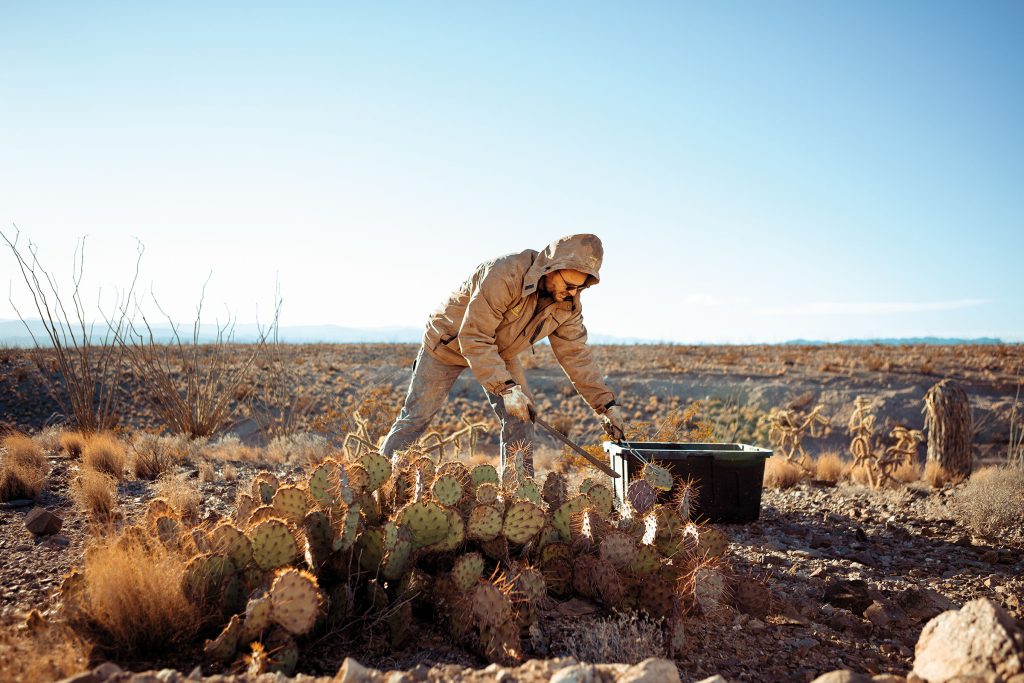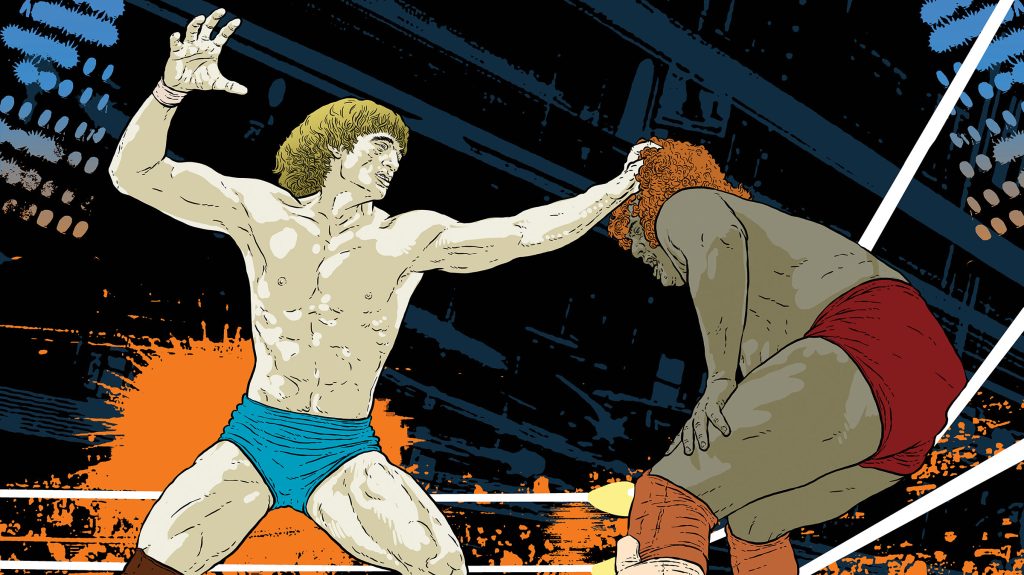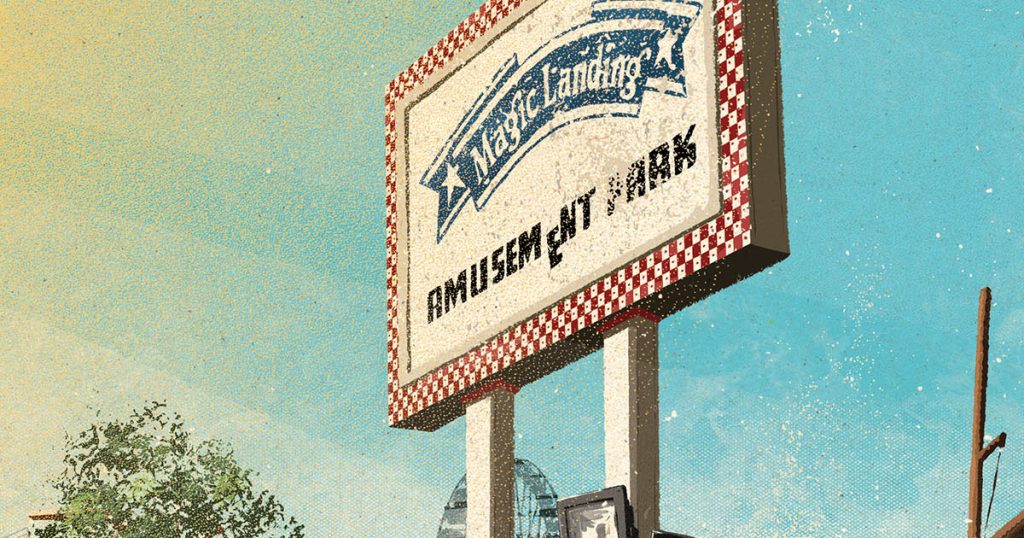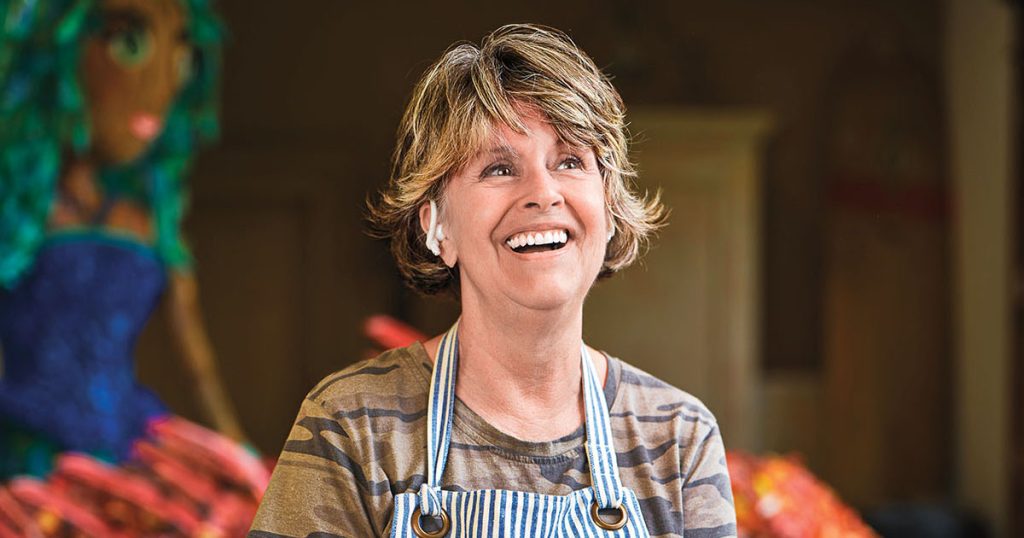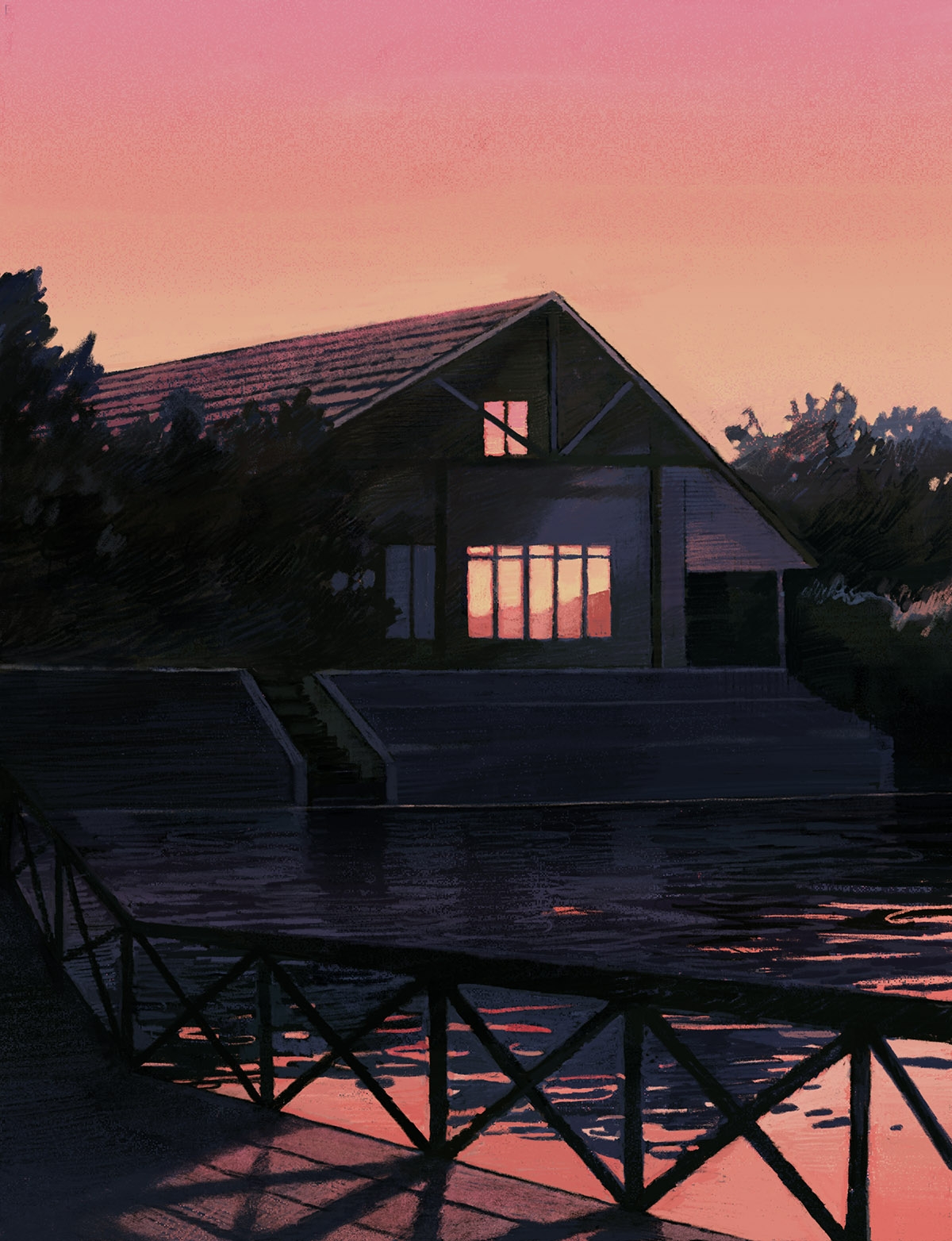
I was newly in love with a boy from Texas when I first visited Possum Kingdom Lake, a serpent-shaped reservoir 80 miles west of Fort Worth, in the summer of 2002. We were living in Brooklyn at the time, and Dale was excited to introduce me to his father’s side of the family, who all gathered at the family lake house for the Fourth of July every year.
We arrived ahead of the crowd, and Dale showed me the cabin. It had a long, rectangular room filled with a row of beds, like accommodations at a hospital or summer camp. There was also a living room temporarily carpeted with air beds, and a screened-in porch that would house additional sleepers. Dale had been coming to the lake house for 10 years, ever since his dad, Dennis, and stepmom, Sherry, acquired the property. He’d been telling me about it ever since we got together.
Soon, the rest of the family began to arrive: Dale’s stepsisters, Kammy and Tammy; Tammy’s husband and sons; and Dale’s three paternal uncles with their spouses and offspring. I don’t think Dale’s sister, Shay, came that year, and Tammy was the only sibling who had children at the time. I grew up in Canada and Colorado, the child of immigrants, and could count on one hand the number of family members we had in the United States. Strangely, my first weekend at Possum Kingdom reminded me of visits to Cairo, where a web of family enmeshed me.
That weekend we set out to explore the lake by motorboat, a new Bayliner Dennis and Sherry had recently purchased. It’s exhilarating—a natural mood enhancer—to slice through the air on the open deck of a boat gliding across water. Dennis encouraged me to take a turn as captain, and I eased into the driver’s seat. I started slowly. The nose of the boat tilted toward the sky as I accelerated, rising above the surface of the lake. The needles inside the gauges on the dashboard danced as the boat bounced over the water, making it difficult to tell how much gas was left in the tank.
The farthest I’ve ever boated across Possum Kingdom in all of our excursions is about an hour in one direction, and even then, we saw just a portion of the nearly 20,000-acre lake. Possum Kingdom is only average size by Texas standards, with the state’s largest lake, Toledo Bend Reservoir, measuring more than 180,000 acres. It would be easy for someone unfamiliar with the geography of Possum Kingdom to get lost while exploring one of its many branches. Experience has proven that trying to find your way back to where you started, you could easily take a wrong turn and end up lost inside one of the lake’s other tentacles.
Like most lakes in Texas, Possum Kingdom owes its existence to a dam. I imagine the valleys filling with water after the new dam went into operation, the back flow of the Brazos River adapting to the hilly topography of the Palo Pinto Mountains and spreading out around the limestone peaks and cliffs like a set of liquid fingers. The Morris Sheppard Dam, erected as part of a Works Progress Administration project, began in 1938 and was completed in 1941. This dam is one of only three major dams that interrupt and regulate the flow of the Brazos along its 840-mile journey through Texas.
There’s always competition for a seat on the boat when it comes time for the big Fourth of July fireworks spectacular at Hell’s Gate. An iconic destination that hosts cliff-diving competitions, the so-called gate is a pair of 90-foot-tall limestone cliffs that face each other, the gap between them carved out by the convergence of the Brazos River and Jowell Creek. As a newcomer that first summer at Possum Kingdom, I was offered a coveted seat on the Bayliner. It was a slow and choppy ride out to Hell’s Gate as boat traffic jammed the lake in the hours leading to dusk. A growing mass of anchored boats spread out on both sides of the cliffs. We dropped anchor and waited for it to get dark.
I felt emotional that night as we watched the fireworks light up the sky. Launched from the tops of the opposing cliffs, their dazzling displays blotted out the real stars, the echo of their detonations rattling inside my chest. I wasn’t typically stirred to tears by pyrotechnics, but celebrating America held special meaning that year, only 10 months after 9/11.
That weekend was my introduction to a place I would visit frequently over the next two decades. When I first ventured there, I never imagined Possum Kingdom would come to hold so much meaning for me. It would be a source of fun and beauty and joy, but also of tragedy.
Shortly after Dale and I moved to Austin in 2006, Dennis and Sherry tore down their original lake cabin and started to build a new house. Two years later, when the house was ready, we reunited there with babies in tow. Kammy’s firstborn, Tristan, was just over a year old, and mine, Maya, was just under a year. We outfitted them in infant life vests, sat on various flotation devices ourselves, and spent hours together in the water. Between bouts of swimming, the babies napped, and sometimes we did, too. Kammy was in her third trimester and would give birth to her daughter Peyton in September, on Maya’s first birthday.
Dale and I had been waiting for weekends like this since leaving New York. I’d hungered to be somewhere with easier access to nature. It always took a lot of effort and expense to get out of Brooklyn for a day or weekend, renting cars or taking trains to various points north, east, and west of the city. Spontaneous hikes weren’t really an option, replaced by walks in Prospect or Central Park, which were often lovely but not the same. I never visited Austin before I moved there, satisfied enough with how I imagined it to be.
I was disappointed to encounter so many strip malls—my first impression of my new city. I had envisioned Austin as green and hilly, with hiking trails cutting through the middle of town. Later, I would discover the creeks and pools and breathtaking Hill Country, but immediately I experienced the city via traffic-riddled Riverside Drive and Lamar Boulevard and Interstate 35. I cried when I pulled into the parking lot of the now-defunct Albertsons where we bought our first groceries because it reminded me of my staid childhood in suburban Denver, which I feared I’d returned to. I was pregnant when we arrived in Texas, and my hormones added to the mix, making me more introspective and emotional.
On that first drive up to Possum Kingdom from Austin, about 240 miles along serene two-lane country roads, I began to appreciate the expansiveness of my new state. We took State Highway 183 to SH 16 to SH 180 to Park Road 33. By now I know the order of the towns we pass—Lampasas, Goldthwaite, Priddy, Comanche, De Leon, Desdemona, Strawn—but in the early days they were as unknown to me as foreign countries. There’s a rhythm to the drive, with the speed limit dropping every 15 miles or so and then picking back up as we pass through these municipalities. We’ve stopped in each of them at one time or another for gas or food or bathroom breaks. When our children were little, we broke up the trip in Goldthwaite, where there’s a nice public playground just off the highway.
The final 2-mile stretch of road to my in-laws’ lake house on Possum Kingdom is over rocky, unpaved terrain. When we’ve invited friends to join us, this is the point where we detail directions by the mile marker: After 1.3 miles, turn left at the fork in the road; 0.7 miles past the cattle guard, take another left. Though this part of the lake has been inhabited since at least the 1950s, it feels only recently pioneered and still very wild.
When my husband’s father and stepmother put down roots in Possum Kingdom in 1993, they leased their 3/4-acre lot from the Brazos River Authority, which at that point owned all the land surrounding this part of the lake. The 30-year lease was expected to automatically renew each year if tenants upheld their obligations to maintain the property and obey water rules. As they invested in site improvements, eventually building a new house on land they did not own, Dennis and Sherry treated the land like it was theirs. After 17 years, they lobbied with other lease holders to successfully pass state legislation allowing them to purchase the land outright. They weren’t concerned about losing their property so much as annoyed by the inefficiency of having to apply to the Brazos River Authority office in Waco each time they wanted to cut down a tree or alter their land.
Possum Kingdom is estimated to have less than 2,000 full-time residents, but the lake population seems to soar into the millions in the summers, when the constant hum of boats and Jet Skis drown out the subtler sounds of nature. Because Possum Kingdom lies between Austin and Wichita Falls—where Dennis and Sherry live—the lake is where we reunite most frequently, at all times of the year.
The house’s decorating scheme is flamboyantly Texas-themed: a coffee table in the shape of Texas; lamps with boots and antique guns as bases; a chandelier with an armature made of belt buckles; bedrooms named after Stephen F. Austin, Sam Houston, and Juan Seguín. As someone who’s now lived in Texas for 16 years, I’m accustomed to seeing such displays of state pride, but it was surprising to me in the beginning. Do any other states have a word like “Texana” to describe a self-glorifying aesthetic?
A big fight erupted within the family in early 2010. The problem at the center was whether to celebrate Dale’s father and stepmother’s upcoming 25th anniversary in August of that year. Dale’s stepsisters wanted to, but Dale and his sister did not, as the anniversary called to their attention the end of their parents’ marriage. The disagreement culminated in a yelling match that led to almost a year of estrangement. And then, one morning, we got a call from Dale’s father.
Dale’s stepsister Kammy and her children were at the lake house with her mother when it happened. The children were scrambling around on a play set after dinner, and Peyton, who was one month shy of 2 years old, stepped on a rattlesnake that was curled around the base of the ladder she was climbing. The snake bit her. Sherry called 911, and they all got in the car and raced toward the ambulance, which transported them to a helicopter that airlifted Peyton to Cook Children’s Medical Center in Fort Worth. Kammy’s husband, Jeff, raced there from Pflugerville, where he’d stayed behind for the weekend, and Dennis rushed in from Wichita Falls, along with Tammy and her family.
They administered anti-venom at the hospital when Peyton arrived about two hours later, but it was too late. Peyton’s small size, plus being struck near the ankle twice by a juvenile snake—juveniles tend to release all their venom at once rather than rationing their supply—conspired against her. Peyton died at the hospital a few hours later.
The tragedy brought our family back together, making the fight seem trivial and overblown. Our early, pained reunions took place in Wichita Falls. Kammy was pregnant when she lost Peyton and gave birth to her son Kaden a few months later. I had my son, Jasper, two months after that. Again, Kammy and I found ourselves with babies the same age, cousins born back-to-back.
Dale’s father was the first person in the family to return to the lake. The place was not just a home to him, but as someone who grew up working-class, also a symbol of what he’d achieved in life. When he was a junior accountant at a firm he eventually came to own, his boss hosted him and his young family at his house on Possum Kingdom. My father-in-law also claims Possum Kingdom is the prettiest lake within driving distance of Wichita Falls. Sherry later made peace with the lake and returned there after much prayer and healing, as did Kammy and Jeff and their children.
Dennis and Sherry undertook various measures to make the property more snake-proof: hardscaping the side yard where the snake struck Peyton, raising the stone wall around the perimeter of the property, hiring a snake wrangler to investigate the wilderness surrounding the house and smoke out any dens.
But I couldn’t stop thinking of snakes whenever we visited. I didn’t want my children playing in the grass and tried to confine them to the concrete deck. They had to wear shoes whenever they went outside, a rule that was hard to enforce. And if they went anywhere near the water, of course they had to be in life vests. I’d seen firsthand that children surviving their childhoods was not a given, and now I was terrified of losing my babies.
In the 12 years since Peyton’s death, there have been a couple of rattlesnake sightings at the property, none of them life-threatening. Reports trickled through the family—of the snake taken down with a shotgun, of the ones that were spotted and slithered away. We raised our kids to be hyperaware of the possibility of lurking snakes, to always look before they stepped, to be careful when they picked up rocks, and to never put their hands into burrows or anything cave-like.
I’d never personally encountered a rattlesnake at the lake house until last summer. It was just the four of us at the lake that weekend—me and Dale and our kids. We were enjoying a peaceful night of stargazing on our backs at the boat dock when my son, who was 10 at the time, got bored and decided to walk up to the house. From the top of the hill, he called back to us, “Guys, there’s a snake.” He was calm and proceeded indoors. We followed a few minutes later, and sure enough, there was a rattlesnake in the walkway. A juvenile, it appeared, like the one that struck Peyton.
A year after Peyton died, a massive fire ravaged Possum Kingdom, burning more than 100,000 acres and over 100 homes. The fire burned to within a quarter-mile of the lake house. The gravel road that leads down to their property acted as a shield that kept the flames from leaping over to consume the brush on their land. For years after, the charred remains of burnt trees flanking the road greeted us like morbid sentries whenever we came to the lake. But the resilience of nature played out slowly before our eyes, and eventually new growth took over, replenishing what was destroyed.
As a family we too have had to rebuild ourselves, and Possum Kingdom has played host and witness to these regenerative cycles. Kammy went on to have another daughter, Alexis, and raised her kids coming to the lake. I admired her fortitude. Here I was fixating on the possibility of darkness when she knew it firsthand and didn’t appear to live in fear. Raising rattlesnake awareness became a passion for Tammy in the wake of Peyton’s death. She started a nonprofit, Peyton’s Project, to provide education about venomous snakes to local communities and to stock rural hospitals in Texoma, like the ones near Possum Kingdom, with anti-venom. She turned the family’s heartbreak into a life-saving operation.
Possum Kingdom Lake has been a great teacher to me over the years, imparting lessons on resilience, growth, and adaptation. I have learned that places and people can recover from unimaginable devastation, and it’s not necessary to abandon a site of trauma for healing to occur. I saw this happen in New York when I lived there, having moved to the city just three weeks before 9/11. In the five years I was there, I watched the city rebuild in the aftermath of catastrophic loss and emerge from the wreckage. I thought we had seen the last of Possum Kingdom after Peyton died, that no one from the family would be able to return. But our history with the place continues, persisting alongside the memories of what we’ve lost.
